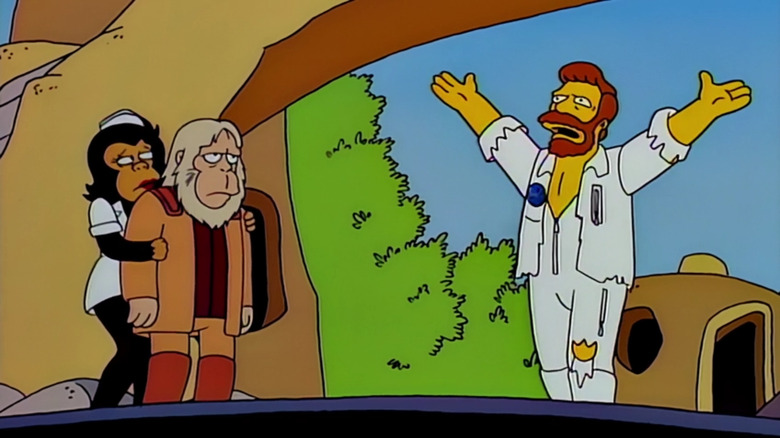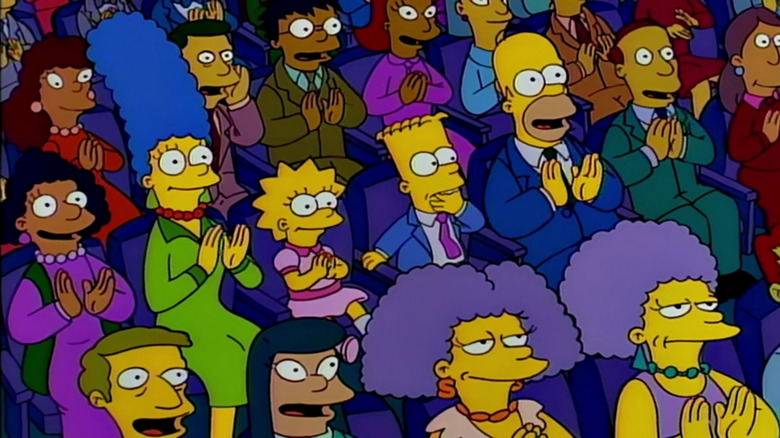The First Draft For The Simpsons' A Fish Called Selma Didn't Even Feature The Planet Of The Apes Musical
"A Fish Called Selma" is a fun season 7 episode of "The Simpsons," notable for being Troy McClure's (Phil Hartman) most prominent episode in the show, and for being one of the few episodes in the series where the writers seemed to want us to care about Selma, Marge's grouchy, unpleasant sister. Much like with Sideshow Bob before him or Fat Tony afterward, here Selma falls in love with Troy McClure, only for the relationship to tragically fall apart by the end of the episode.
In terms of the episode's impact on pop culture, however, it's the "Planet of the Apes" musical number scene that's most effectively stood the test of the time. A lot of millennials might not remember Falco's one-hit wonder "Rock Me Amadeus," but they definitely remember the "Dr. Zaius" parody version this episode pulled off. "The Simpsons" is filled with memorable musical moments, like the Kids vs Adults song in season 10 or "Oh, Streetcar!" in season 4, but the "Planet of the Apes" musical might be the show's best.
That's why it's a little surprising to find out that the song wasn't in the episode's original script. The entire musical, in fact, was not in the original script. At first, all the writers knew was that they needed Troy McClure to get his big comeback role as an actor. "That was the big question," writer Josh Weinstein explained to Variety in 1998 (via Vulture). "What is his big comeback gonna be?"
Now that's theatre!
In the first draft, written mainly by freelance script-writer Jack Barth, McClure's comeback role was "like a movie or a TV show," showrunner Bill Oakley recalled, but perhaps that was a little too obvious. Why not put the actor into the much more respectable world of theatre instead? They ended up giving us a few minutes' worth of an absurdly fast-paced, over-the-top musical that's both a parody of the famous '68 film and a parody of '80s Austrian pop music. It also throws in a bunch of doctor-related jokes while they're at it.
It's exactly the sort of over-stimulating entertainment that makes mindless TV so captivating, which of course is why Bart and Homer — two people you'd be expect to be bored by a standard musical — are absolutely enthralled by it. "This play has everything," Bart marvels. Homer says immediately afterward, "I love legitimate theatre!"
The sequence also sticks around to give us the show's closing number, which is meant to sound like a generic shmaltzy song in an old school musical. "When someone pitches a joke like 'chimpan-A to chimpan-Z,' you start thinking of even better jokes and it all builds on itself," explained Josh Weinstein. "One nugget of an idea leads to a brilliant sequence, and that's what 'The Simpsons' room does best, with everybody feeding and playing off of each other."
It results in an almost absurd amount of jokes and references thrown into a single sequence, displaying a level of effort and energy from the writers that you just don't see in many other shows. The writers didn't need to go the extra mile with Troy's comeback performance, but it's their constant willingness to go all in on a one-off joke that made classic "Simpsons" one of the best shows on TV.

